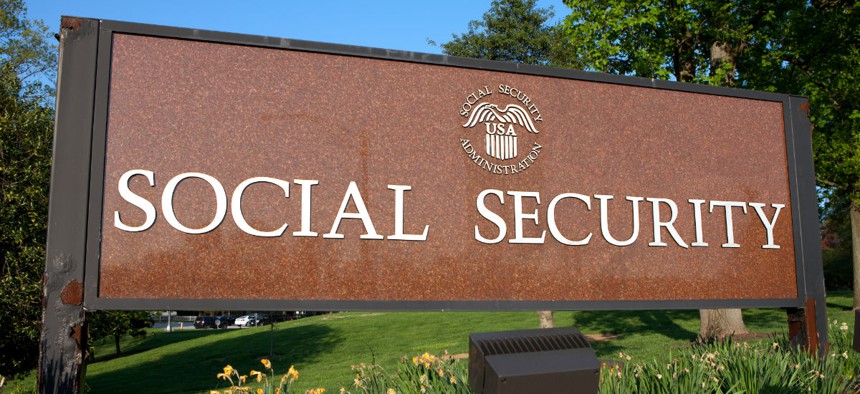
Mark Van Scyoc / Shutterstock.com
Impasses Panel Guts Telework, Official Time for Employees at Social Security Administration
Although the Federal Service Impasses Panel frequently sided with management, it knocked down multiple efforts to reduce the scope of grievance procedures.
A panel tasked with resolving contract disputes between agencies and federal employee unions sided with management at the Social Security Administration on several key issues, gutting official time and telework rights for union employees at the agency.
In a May 29 decision, the Federal Service Impasses Panel weighed in on 12 proposed articles of a new contract between SSA and the American Federation of Government Employees. The panel asserted jurisdiction over the matters after labor and management officials negotiated for seven months on a new collective bargaining agreement, eventually coming to agreement on more than 50 provisions.
The panel gave a green light to a proposal by Social Security officials that would significantly reduce the amount of official time AFGE employees can spend on representational duties. According to the agency, the union used “roughly” 181,181 hours of official time during fiscal 2018, which officials said cost nearly $10.5 million. The agency proposed a “bank” for the union as a whole at 50,000 hours of official time per fiscal year, with individual employees capped at between 250 and 650 hours per year, and said it “is seeking to eliminate official time ‘loopholes.’ ”
AFGE offered to reduce the existing bank of official time hours from the 250,000 hours per year under the current contract to 230,000 per year. The panel sided with management at the agency, citing their use of quantitative data to support their proposal, something the union did not provide, although members noted that they were reluctant to do so.
“Much of the agency’s argument is devoted to explaining why it believes management needs to reduce existing amounts of official time and rebutting the union’s arguments,” the panel wrote. “The agency offers little justification, however, to buttress its proposed amount of official time. Nevertheless, in light of the record that is before the panel, we will adopt the agency’s amount as the most appropriate under the circumstances of this dispute.”
The panel also sided with management on issues related to telework and flexible work schedules, issuing contract language giving Social Security deputy commissioners the authority to determine how often employees can work remotely, the percentage of employees who can work remotely, as well as whether employees with telework agreements can also use alternative work schedules. Deputy commissioners also can make “immediate” changes to the agency’s telework program “without negotiation” with the union.
Management cited several agency officials who reported temporarily increased wait times at field offices following the implementation of telework.
“Many of the officials referenced that, although they were able to address issues arising due to telework, they had to follow a request process that did not result in immediate action,” the panel wrote. “We agree that management needs maximum flexibility to ensure that its functions can be performed in a timely and efficient manner. Therefore, the agency’s proposal represents the best balance of interests for all involved stakeholders.”
One area where AFGE was able to secure a victory was on grievance procedures. Management sought to block employees’ ability to pursue negotiated grievances over performance ratings, discipline and other adverse personnel actions, and nearly a dozen other topics. The agency had argued that in many of these instances, having grievance procedures was wasteful and duplicative, because they also can be appealed to the Merit Systems Protections Board.
The panel cited 1983 U.S. Court of Appeals decision AFGE v. Federal Labor Relations Authority, which established that in the case of reducing the scope of grievance procedures, the party that seeks to make the change must “establish convincingly” the need for a more limited scope. It also noted that in some instances, employees’ ability to seek recourse through the MSPB is limited, at best.
“The agency claims it should not have to devote financial resources to arbitration when ‘other appropriate forums’ are available to employees,” the panel wrote. “Although the agency does not specify what forums it is referring to, it appears that the agency is referencing the MSPB. Although the agency cites financial concerns for its proposal, it does not actually offer supporting data on this point in its arguments.”
SSA did not respond to a request for comment on the panel's decision.
In a statement following the decision, AFGE National President J. David Cox said the Social Security Administration’s efforts to gut grievances, official time and telework are part of a broader effort in the Trump administration to neuter collective bargaining at federal agencies.
“This is part of an orchestrated effort by the Trump administration to weaken unions and silence the voices of federal workers,” Cox said. “Every day across this country, Social Security employees help Americans live out their lives with financial security and human dignity as they age or become disabled. Yet the Trump administration is doing everything they can to make sure SSA workers don’t enjoy that same level of dignity, fairness or respect.”







